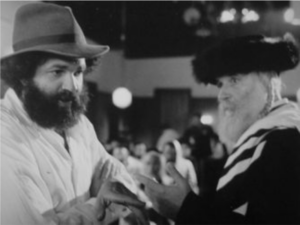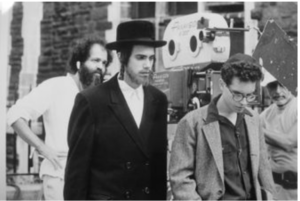A scene that was so Jewish it wound up on the cutting-room floor
The director of ‘The Chosen’ recalls a sequence that didn’t make the final cut
This essay is part of the Forward’s list of 125 greatest Jewish movie scenes. You can find the whole list and accompanying essays here.
Can a scene be too Jewish to film? That was an issue I had to face when I was directing “The Chosen,” based on Chaim Potok’s famed book.
It was a very hot summer in Brooklyn and on the first day of filming I had planned many setups for the opening baseball game between two groups of young Jews — one of which consisted of Hasidic boys dressed with black wool pants, white shirts, black suspenders and payot, the side locks of hair that Hasidim grow and don’t cut.
We couldn’t get anyone from the very orthodox Hasidic groups to portray these boys; some Hasidim had even taken ads out in Yiddish papers urging people not to participate in this movie. So, I cast actors who, of course, didn’t have payot. Our hair and makeup people created curly hair pieces to attach to the boys’ heads so they looked appropriately Hasidic.
During our lunch break, our actors left the playground to eat. A half-hour later, I looked up and saw dozens of these boys running back toward our set. They were being chased by local kids. This neighborhood was not Jewish.
As our actors scurried toward us, they pulled off their hair extensions. “We’re not Jews!” they shouted at their would-be assailants. ”We are actors!”
Edie and Ely Landau, the daring producers who had the courage to make “The Chosen,” had made other fine films dealing with Jewish history like “The Pawnbroker” and “The Man in the Glass Booth,” but this movie was about our religion, about who and what is a Jew and how we express that in our lives and rituals.

Two of the major characters in “The Chosen” are Hasidic — the rebbe (played by Rod Steiger) and his son Daniel (played by Robby Benson). To accurately and compassionately show their lives, this meant early morning prayers, tallit, kosher homes, and strict Shabbat celebrations. In one scene, during a Shabbat morning service, the rebbe takes out the Torah and his congregants come up to kiss it. Well, for my producers, this was too much.
I argued that this has been a custom for millennia, but for them, it seemed strange and alien, too extreme and they insisted the scene be taken out of the movie. I did not have final cut so the scene exists only in some hard to find VHS copies (and on this vimeo clip.)

Let me make this clear, I am forever indebted to the Landaus for choosing to make “The Chosen” and for having selected me to direct this movie. It changed my life as a Jew introducing me to our spiritual past and kabbalistic practices.
Years later, when she was planning to make “Yentl,” Barbara Streisand approached me to talk about how I made “The Chosen.” She told me that she wouldn’t put those payot on her actors playing Hasidic students and parents — way too Jewish. Even for a brilliant, widely admired star like Streisand, the issue of acceptability was a concern.
Assimilation has always been a challenge for us. Being the son of a Reform rabbi, I had known nothing about Jewish orthodoxy, but having made this movie opened up for me a wider appreciation of who we are and who we were and, unlike some other Jewish storytellers who sometimes quite successfully mock our idiosyncrasies, I have been committed to honoring the varieties of being Jewish in the films I have made including “The Chosen,” “Crown Heights,” “Golda’s Balcony,” “Bobbie’s Girl,” “Conspiracy: The Trial of the Chicago 8” and “The Big Fix.”





















